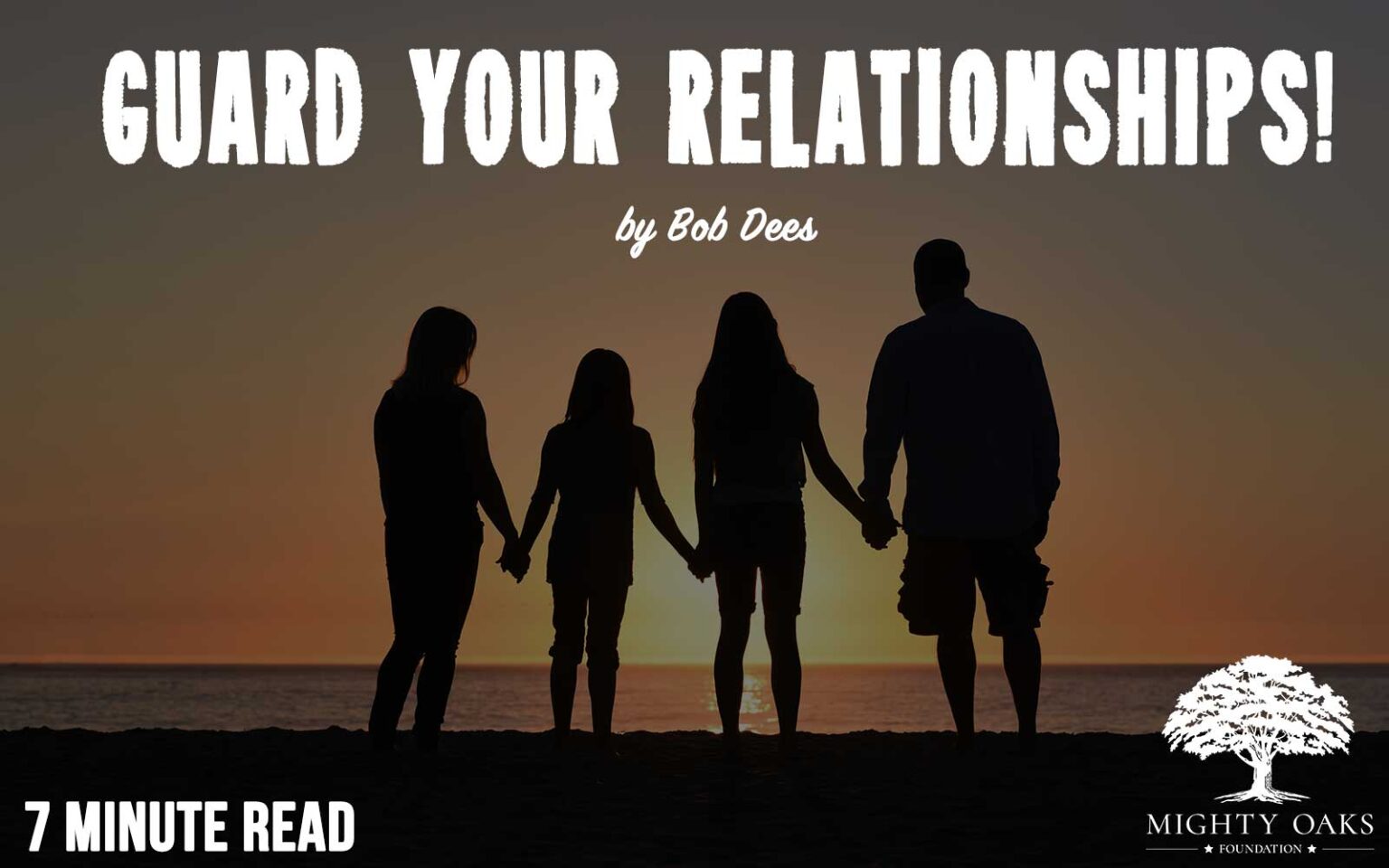We had just lost our first child. In her initial anguish, Kathleen asked me to protect her from many well-meaning sympathizers, including her loving yet sometimes smothering mother. As a young, inexperienced husband I heartily carried out her wishes, no doubt offending many. In particular, I protected my wife from her mother a little too well. While giving my wife the breathing space she needed for a brief time, I did not navigate the situation well with my mother-in-law. In short, I did not interact properly with Kathleen’s Mom, who was also grieving the loss. Regrettably, it took a number of years to regain the trust that had been broken.
Later in life as we navigated another storm, a wise friend advised, “Guard Your Primary Relationships.” This time I/we were able to follow this admonition and navigate crisis more graciously. Following that experience we learned that in crisis people often attack the ones they love the most, perhaps because they feel secure in venting with those closest to them. This is a human tendency that we all need to guard against when navigating crisis of all forms, including COVID19, economic downturn, and the isolation and inactivity of health quarantines.
Over the years of challenges and body slams, Kathleen and I coined a phrase to apply to such situations: “We are not the enemy.” In essence this simple expression, often shared between us during times of trauma and stress, is a simple reminder to “close ranks” and link arms against the real challenges we face. The same principle applies to other close family and inner circle friends; it is critical to intentionally draw close to avoid a wedge in key relationships at such critical times.
So what does “Guard Your Primary Relationships” look like?
- “The Lord is my rock and my fortress and my deliverer, My God, my rock, in whom I take refuge; My shield and the horn of my salvation, my stronghold. (v. 1, 2)
- “In my distress I called upon the Lord, and cried to y God for help. He heard my voice out of His temple, and my cry for help before Him came into His ears. (v.6)
- “They confronted me in the day of my calamity, but the Lord was my stay. He brought me forth also into a broad place; He rescued me, because He delighted in me. (v. 18, 19)
- “The Lord lives, and blessed be my rock; and exalted be the God of my salvation.” (v. 46)
And note that David closes with gratitude, “Therefore, I will give thanks to You among the nations, O Lord.” (v. 49)
Another very practical reason for pressing into God is that He is the only true healer. In Exodus 15:25-27, God tells Egypt “…I, the LORD, am your healer.” On the battlefield when troops are wounded, they don’t call for the general; they unashamedly call for the medic and the chaplain to help mend their wounds of the body and soul. Certainly God works through our many great medics, chaplains, physicians, mental health professionals, pastors, counselors, family and friends, but God is the ultimate healer. Psalm 147:3 reminds us that “He (God) heals the broken hearted and binds up their wounds.” As well, Psalm 34:18, 19 (underlines added) reminds us that “The Lord is near to the brokenhearted, and saves those who are crushed in spirit. Many are the afflictions of the righteous, but the Lord delivers him out of them all.”
The ultimate success factor, the “secret sauce,” is to never quit pressing into the God who created you, who loves you, who will heal you, and who will continue to use you powerfully in the lives of others. We must continue to press into this Healer God as the process of navigating crisis extends from days to weeks to months.

The baseball great Willie Mays was once asked why he was an All-Star player. He simply responded:
When they hit it to me, I catch it.”
His comment speaks profoundly to the importance of BASICS. We have said the basic pillars of “Guarding Your Primary Relationships” are 1) God, and 2) Others. Now let’s get more specific regarding Others.
To avoid close quarters relational train wrecks during these days of COVID 19, consider these BEHAVIORS TO AVOID when “Guarding Your Primary Relationships:”
- Criticism. Some forms of criticism are constructive, but in this case criticism refers to making negative judgments or proclamations about another in extreme, absolute terms. A sign that you may be engaging in this more harmful form of criticism is if you catch yourself using terms like “never” and always”—for example, “You never think about anyone but yourself!” or, “You are always so stubborn!”Constructive alternative: There’s nothing wrong with voicing concerns and complaints in a relationship, but try to do so in a way that focuses on your own feelings rather than criticizing the other person. For instance, “I feel neglected when you make plans without me” rather than “You are so inconsiderate!”.
- Contempt. Contempt is a more destructive form of criticism that involves treating another person with disrespect, disgust, condescension, or ridicule. It may involve mean-spirited sarcasm, mockery, eye-rolling, sneering, or name-calling. Contempt can grow over time when a person focuses on the qualities they dislike in a person and builds up these negativeness in their mind.Constructive alternative: Instead of keeping score of all of another person’s flaws, consider their positive qualities and the things you appreciate most about them. In fact, it may help to write a list of these qualities and return to it when you need a reminder.
- Defensiveness. Defensiveness tends to arise when people feel criticized or attacked; it involves making excuses to avoid taking responsibility, or even deflecting blame onto the other person. Even if the other person made some mistakes, that doesn’t free you from responsibility for things you could have done differently as well. The problem with defensiveness is that it communicates to family or friends that you aren’t really listening to them or taking his concerns seriously. By introducing new grievances, you can also exacerbate the conflict by making them feel attacked.Constructive alternative: Take the time to hear your partner out and take responsibility when appropriate. A simple, genuine apology can go a long way.
- Stonewalling. Stonewalling involves putting up a wall between you and another person by withdrawing, shutting down, and physically and emotionally distancing yourself from them. Stonewalling is especially destructive to relationships because it can make another feel abandoned and rejected, risking longer term emotional cutoff.Constructive alternative: If you need time out to take a few deep breaths and collect your thoughts, let the other person know, and then return to the conversation when you’re ready. This way, the other person will understand that you are taking care of yourself, not trying to reject them.
(extracted from “Avoiding The Four Horsemen in Relationships”)
Yes, these reminders are pretty basic, but they are critical to relational health and resilience, particularly under the stressors of COVID19. In fact, there is no better time than NOW for all of US – spouses, parents, siblings, other family and friends — to work on building trusting relationships and healthy communication.
Yes, it is definitely the time to “Guard Our Primary Relationships” with God, and Others.
~James 1:19b
So what about YOU?
Are you “Guarding Your Primary Relationships with GOD?
With Others?
How can you model this for others during COVID19 lock down?
Share with us in COMMENTS below.
Read more from Maj. General Robert Dees here: https://resiliencegodstyle.com/resilience-blog/






